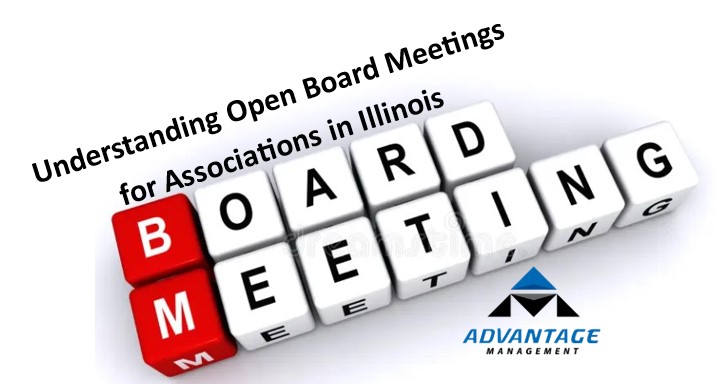The Importance of Open Board Meetings
Open board meetings are a cornerstone of transparency and community engagement in associations. In Illinois, the Condominium Property Act mandates that board meetings must generally be open to all deeded unit owners. This ensures that the association’s operations are conducted in a transparent manner and that unit owners have an opportunity to observe and participate in the governance of their community.
Legal Requirements
Under the Illinois Condominium Property Act (765 ILCS 605/), several key provisions outline the requirements for open board meetings:
Notification: Notice of board meetings must be given to all unit owners at least 48 hours in advance. This can be done via mail, email, or posting in a prominent place within the property.
Access: All deeded unit owners are allowed to attend and observe the proceedings of the board meetings. They should also have an opportunity to speak at appropriate times, although the board can establish reasonable rules governing this process. This will usually occur in an open forum.
Minutes: Minutes of the meetings should be maintained and made available to unit owners once they are approved at the next meeting. These records provide an official account of the decisions and discussions that occur and are available on Advantage’s web portal.
Agenda and Discussions
During open board meetings, various topics relevant to the management and maintenance of the association are discussed. These can include:
- Financial reports and budgeting
- Maintenance and repair projects
- Policy changes and rule enforcement
- Contract approvals
- Community events and initiatives
The open meeting format promotes accountability and allows unit owners to stay informed and engaged with the decisions that impact their living environment.
Executive Sessions: A Closer Look
While the principle of transparency is vital, there are circumstances where privacy and confidentiality are necessary. For these situations, the board can enter what is known as an executive session.
Permissible Topics in Executive Sessions
Executive sessions are closed to unit owners who are not on the board, and their use is limited to specific matters that require confidentiality. According to Illinois law, the following topics can be discussed in executive session:
1. Personnel Matters: Discussions regarding employment issues, such as hiring, firing, or performance evaluations of association employees.
2. Litigation: Any matters related to pending or potential litigation. This includes discussions with legal counsel about the association’s legal strategy.
3. Rules Violations: Hearings and discussions involving violations of the association’s rules and regulations by unit owners. This protects the privacy of the individuals involved.
4. Contracts and Negotiations: Negotiation of contracts or consideration of certain business transactions where premature disclosure could harm the association’s position.
5. Owner Delinquencies: Discussions about individual unit owners’ financial delinquencies, such as unpaid assessments or fines, which are sensitive and private.
Balancing Transparency and Confidentiality
The dual approach of open meetings and executive sessions allows associations in Illinois to maintain a balance between transparency and the need for confidentiality. By adhering to the legal requirements and best practices, boards can foster a sense of trust and community among unit owners while effectively managing sensitive matters.
For unit owners, understanding the distinction between open board meetings and executive sessions and knowing what can be discussed in each setting is crucial for active and informed participation in their association’s governance.
Open board meetings and executive sessions serve different but complementary purposes in the governance of associations in Illinois. By ensuring open communication and transparency through regular board meetings while protecting sensitive information in executive sessions, associations can effectively manage their communities and maintain the trust of their unit owners.


Recent Comments